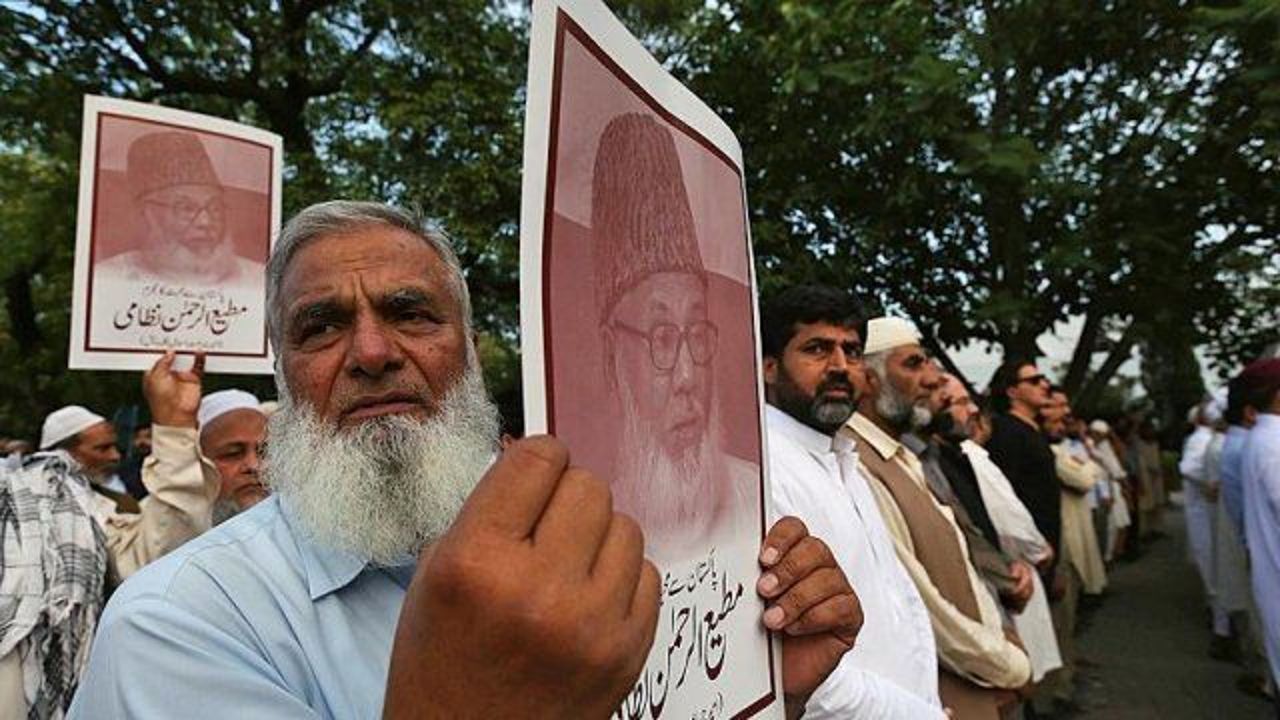'Bangladesh's Nizami urged patience before death'
“Stay patient” were the last words of Bangladesh’s Jamaat-e-Islami leader Motiur Rahman Nizami before being hanged last night, his son said.

Hours after burying his father, Mohammad Nakibur Rahman told Anadolu Agency on Wednesday that Nizami “asked all of us to remain patient” and wished for “all of us to see each other in Jannah,” or Heaven.
Motiur Rahman Nizami, the leader of Bangladesh’s Jamaat-e-Islami party, was convicted by the nation’s International Crimes Tribunal and hanged on accusations of committing atrocities during Bangladesh’s 1971 War of Independence.
Jahangir Kabir, a prison official, confirmed to Anadolu Agency reporter that Nizami was hanged at the Dhaka Central Jail at 12:10 a.m. local time Wednesday (18:10 GMT - Tuesday).
Rahman, an assistant professor of finance at the U.S.’ University of North Carolina, and a human right activist, said Jamaat-e-Islami had supported a united Pakistan and been “very active in keeping Pakistan united”.
But Jamaat had “no relationship with atrocities that took place,” as it “was involved only in political campaigning,” he said. “They made statements, they were engaged in staging rallies, and these were the activities that the Jamaat held”.
He said that the party leaders thought “Bangladesh would not be able to truly be independent if the country were separated with the help of India”.
Rahman said that atrocities were committed by the Pakistani army, “but Jamaat had nothing to do with them”.
Asked if he thinks like other Jamaat leaders that India is behind Nizami’s execution, Rahman replied: “There is no doubt about that”.
‘Jamaat will be stronger’
Nizami had served as the head of Bangladesh’s Jamaat-e-Islami since 2001, succeeding Gholam Azam.
He served first as agriculture minister and then as industries minister in 2001-2006 under the Bangladesh Nationalist Party-led coalition government. He was also member of parliament from his own constituency Pabna-1 in 1991-1996, and then also in 2001-2006.
Asked if the execution of its leader would deal the party a severe blow, Rahman said it would not.
He said all these executions are “only a sacrifice… [and] are making the Jamaat stronger” because, according to him, people are realizing who the victim of the India-backed government is.
He said Jamaat “is the true patriotic party” and the only one that has stood against “aggression” from India.
Rahman said he hoped the party will get “more and more popular” and its leader’s sacrifice will make it stronger, adding, “In the future inshallah the Jamaat will be more powerful than ever before”.
World reaction
Rahman said they got condolences from all over the world – both the Muslim world and the West – and he had heard many condemnations.
Nizami’s execution was strongly opposed by the UN, and the U.S. also voiced concerns.
Amnesty International issued a statement saying, “The death penalty is always a human rights violation, but its use is even more troubling when the execution follows a flawed process”.
On the weak reaction from Muslim countries, Rahman said, “Unfortunately, most Muslim countries are oppressive as well, and there is not much room for free speech and assembly”.
He said there was reaction in the Muslim world “but we do not see it because as you know these countries are not very free”.
Rahman distinguished Turkey as a country where the reaction had been widespread, with protests in front of Bangladeshi Embassy in Ankara and elsewhere.
“We are very grateful for what President [Recep Tayyip] Erdogan is doing,” Rahman said of Erdogan denouncing the execution. “As always, President Erdogan is taking the side of the oppressed people around the world”.
He said, “Erdogan is probably the only world leader who is speaking for oppressed people all around the world,” including Egypt, Palestine, Syria, and Rwanda, adding that he is doing whatever he can for the oppressed.
No clashes
Rahman said that despite Bangladesh having “zero tolerance for assembly,” thousands of people took to the streets to oppose the execution.
“We are advising people to avoid any clashes with security forces,” he said, as that would be “counterproductive”.
Rahman said his father was already “buried as soon as he arrived at our village”, but since few people could attend, mass memorial prayers would be conducted throughout Bangladesh during the day.
“At 7 in the morning (01.00GMT) the funeral took place and thousands of people showed up despite mass arrests in our area,” he said.







